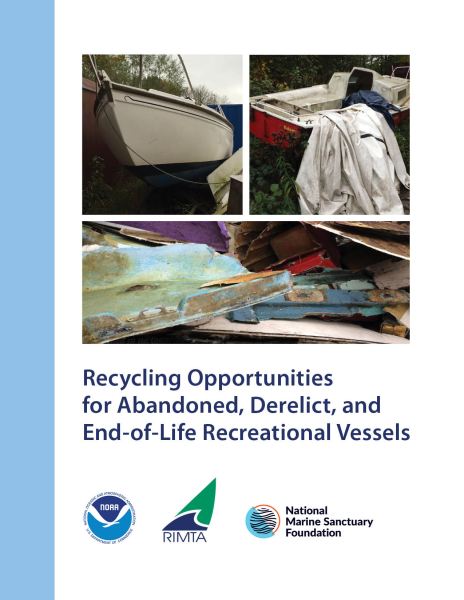 The NOAA Marine Debris Program is pleased to share a report on Recycling Opportunities for Abandoned, Derelict, and End-of-Life Recreational Vessels. Section 136 of the Save Our Seas 2.0 Act (P.L. 116-224) required a study to determine the feasibility of developing a nationwide vessel recycling program, using a pilot project in Rhode Island as a model. The report was created by the Rhode Island Marine Trades Association (RIMTA) Foundation, in partnership with the NOAA Marine Debris Program and National Marine Sanctuary Foundation, in order to summarize that study.
The NOAA Marine Debris Program is pleased to share a report on Recycling Opportunities for Abandoned, Derelict, and End-of-Life Recreational Vessels. Section 136 of the Save Our Seas 2.0 Act (P.L. 116-224) required a study to determine the feasibility of developing a nationwide vessel recycling program, using a pilot project in Rhode Island as a model. The report was created by the Rhode Island Marine Trades Association (RIMTA) Foundation, in partnership with the NOAA Marine Debris Program and National Marine Sanctuary Foundation, in order to summarize that study.
Abandoned and derelict vessels litter ports, waterways, and estuaries around the country, posing a threat to people and the environment. Vessels become abandoned and derelict for many reasons: owners may no longer be able to afford maintenance, they may break loose from anchors or moorings and drift away, and some may even be stolen. Severe weather events, like hurricanes or flooding, can also cause vessels to sink at moorings, become submerged in tidal areas, or strand on shorelines, marshes, or reefs. Boat owners may also struggle to responsibly dispose of vessels that are too old to continue using.
Through a grant from the NOAA Marine Debris Program, the RIMTA Foundation explored the reuse of fiberglass material used to build recreational vessels. Fiberglass can both displace fossil fuels and replace raw resources, such as silica and alumina, in cement production. Through the development of a partnership network, the RIMTA Foundation collected, tested, processed, and delivered 22 tons of fiberglass materials collected in coastal New England from a variety of abandoned, derelict, and end-of-life vessels for reuse by a cement manufacturing facility.
Following the conclusion of this project, with additional funding provided by the NOAA Marine Debris Program in partnership with the National Marine Sanctuary Foundation, the RIMTA Foundation examined the potential to build a nationwide vessel recycling program. Its findings are documented in this report, which found that a centralized, nationwide fiberglass vessel recycling program would present a viable solution for the responsible disposal of abandoned, derelict, and end-of-life vessels. However, the logistics for breakdown, storage, transportation, and co-processing of recovered fiberglass are complex, and further investigation, development, and collaboration is recommended.
To learn more about the challenges and opportunities of recycling fiberglass vessels, view the full report.
